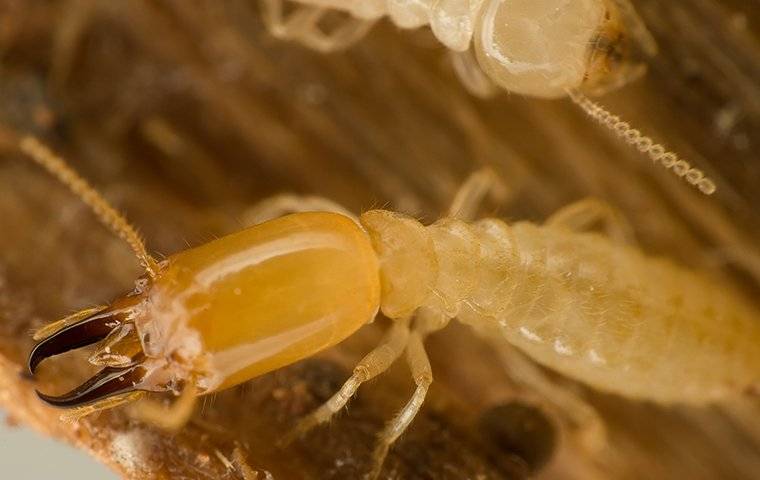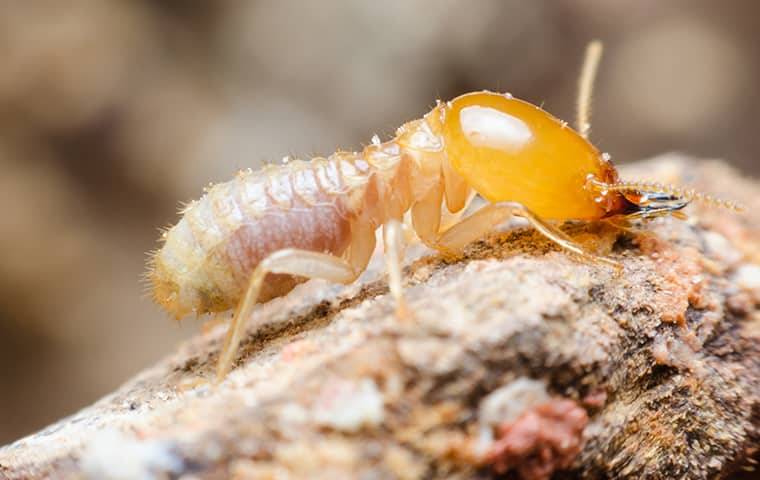As decomposers who aerate the soil, termites may be great for the environment (and your crops), but they’re nothing but a nightmare for Monmouth County homeowners. While appearance can vary based on the caste they’re in, most termites share the same three key traits: thin waists, white to brown coloring, and straight antennae that protrude from their heads.
These critters may get mistaken for ants, but they can cause a lot more damage to your home. Here’s what Monmouth County homeowners should know about what termites eat, the signs of a termite infestation, whether you should treat your home for them, and why termite control is necessary for residents.


What Do Termites Eat In Monmouth County?
Termites aren’t picky eaters, but they’ve got a major hankering for cellulose materials, including:
Wood
Carpet
Insulation
Cardboard
Paper
Fabric
Plants
Animal droppings
Around homes, termites are notorious for eating wood, and even small infestations can cause severe structural damage. The size of the average termite colony can range from around 60,000 to 250,000 termites, but even just a small 60,000 colony is capable of eating through five grams of wood per day.
Signs Of Termites On Your Monmouth County Property
One of the reasons that termites cause so much damage – besides their big appetites – is that infestations can go unnoticed for months or even years. Unlike many pests, termites can stay hidden in your foundation or walls for a long time, which means you’ve got to look for other signs of their presence.
The signs of a termite infestation may be subtle, but they do exist, so here’s what you should be on the lookout for:
Stuck doors and windows: Termites introduce extra moisture into your walls and flooring, which can warp your door and window frames. As a result, windows and doors may suddenly get stuck or feel as if they no longer fit on their frames as they should.
Frass: Termite droppings, or frass, aren’t very big and usually resemble sawdust or coffee grounds. When termites dig their tunnels, they kick out their frass, and it can end up piled near baseboards.
Swarms: When it’s time to mate, reproductive termites leave the colony in swarms. It’s not as common to spot this as some other signs, but you may be able to see the actual swarms flying around your property.
Discarded wings: More often than not, homeowners don’t see the termite swarms, but they do find the shed and discarded wings that termites have left behind. These wings tend to resemble fish scales, and you may find them piled around doors and windows.
“Water-damaged” materials: Peeling paint, discolored, or drooping drywall can all come from the extra moisture that termites bring into your walls and floor.
Hollowed wood: Wood that sounds hollow when you tap or step on it may be due to the invasive tunnels that termites create.
Should I Treat My Home For Termites If I Don’t Have Them?
While termites are harder to prevent than most pests, it is recommended that you get an annual termite inspection of your home from a pest management professional. Given how subtle the presence of termites can be, many homeowners still miss them, but an experienced professional won’t. Having an annual inspection can help catch termite problems while the infestation is still small and hasn’t caused a lot of damage, and that can make all the difference in getting rid of these pests.
Why Termite Control In Monmouth County Is Necessary
DIY termite solutions, like OTC insecticides and baits, may eliminate some of the problem, but they’re usually ineffective at completely getting rid of termites. In fact, the only foolproof way to eliminate termites from your home is with professional help from Alliance Pest Services in Monmouth County.
Our experienced professionals have dealt with termite infestations, both big and small, and we’ve got the right treatments to make your Monmouth County home termite-free. If you’re noticing some of the signs that we’ve highlighted above or just think it may be time to schedule that annual inspection, there’s only one thing to do – call us at Alliance Pest Services to learn more about how our termite control services work or to set up an appointment.
Latest Blogs
Stay informed about pests and pest related issues in your area!
Dangerous Spiders Of Columbia, MD
If three different spiders are placed in front of you and you are told to pick up the harmless one to win a million dollars, would you feel confident enough to do it?
The Easiest Way To Get Bats Off Your Monmouth County Property
Do you see an increased amount of bats around your home lately? Learn the best way to get bats off of your property.
Are The Fleas In Monmouth County Causing You Headaches?
Prevent and treat fleas with help from Alliance Pest Services in Monmouth County.
Request Your Free Quote
"*" indicates required fields


